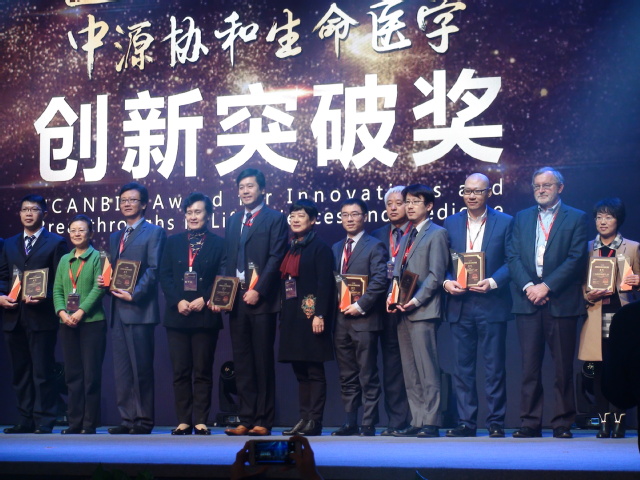Reported by: Wang Ji
Translated by: Sun Jianyao
Edited by: D. Parker
Date: 2017-11-16
On November 11th, 2017 the awards ceremony for the second VCANBIO Awards for Bioscience and Medicine was held in Beijing. By virtue of their outstanding achievements and contributions in the field of life medicine, thirteen Chinese and foreign scientists were honored with the following awards: the "Award for International Cooperation", the "Award for Outstanding Achievement" and the "Award for Innovation and Breakthrough." Professor Huang Zhiwei from HIT’s School of Life Sciences won the "Award for Innovation and Breakthrough".
The VCANBIO Award for Bioscience and Medicine is a renowned award in the field of life medicine. It was established by the University of Chinese Academy of Sciences, VCANBIO Cell and Gene Engineering Co., Ltd. and Shenzhen VCANBIO Biotherapy Foundation. Its purpose is to recognize outstanding domestic and foreign scientists who have contributed breakthrough innovations in the field of life medicine. It also honors young talents with great potential for innovation in the field of life medicine. The goal: to contribute to promoting the industrialization of life science and technology both at home and abroad. The selection committee is chaired by academician Xu Guanghua, with a number of academicians and experts as members. The VCANBIO Award for Bioscience and Medicine gives one “Award for International Cooperation”, two “Awards for Outstanding Achievement” and ten “Awards for Innovation Breakthrough”.
As one of the most prestigious and influential awards in the field of life medicine in China, the VCANBIO Award for Bioscience and Medicine is highly recognized for its purpose of “encouraging talents to make innovations and promoting the development of the life medicine industry” with the principles of science, objectivity, fairness and justice.
Professor Huang Zhiwei is primarily engaged in the study of pathogen-host interaction. By studying the structure and function of HIV Vif and the human protein complex, he has solved the 30-year-old mystery of AIDS bringing to AIDS patients the hope for a cure. The results obtained from the research on the bacterial adaptive immune system such as CRISPR-Cpf1, C2c1, SpyCas9, and the molecular mechanisms of interacting with bacteriophage are critical for elucidating the co-evolution molecular mechanism of bacteria and phage, and also provide the structural basis for specific, efficient and accurate gene editing.

Awarding ceremony


